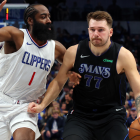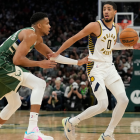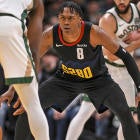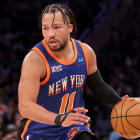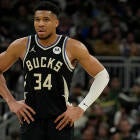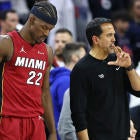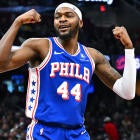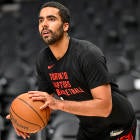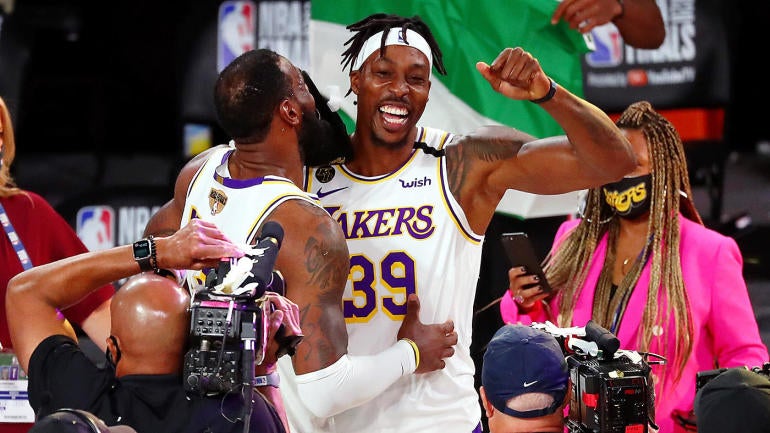
Dwight Howard is an NBA champion. It's hard to overstate just how unlikely that was as recently as a year ago. Howard was once viewed as among the most toxic teammates in the NBA. His hometown Atlanta Hawks dumped him only a year into a $70 million contract. He then lasted only a single season in Charlotte before being traded and waived, followed by another one-year stint with a team that suffered almost immediate buyer's remorse. Kobe Bryant himself openly questioned Howard's commitment to winning. Bryant couldn't fix him in Los Angeles. James Harden couldn't in Houston. LeBron James, however, could.
Howard held so little value when the Lakers signed him that they didn't even need to guarantee his salary. They only pursued him in the first place after DeMarcus Cousins tore his ACL. But Howard entered LeBron's atmosphere and became the perfect role player, just like so many before him.
In Miami, it was Chris Andersen. Once banished from the NBA entirely due to drug use, Andersen was released by the Denver Nuggets in the midst of a criminal investigation (of which he was later cleared). The Heat take a chance on him, and he becomes a model citizen on the way to the 2013 championship.
In Cleveland, there was JR Smith. So far had his star fallen that the Knicks forced the Cavaliers to take him on as a condition of their Iman Shumpert trade. The Knicks wanted to dump his contract. He became Cleveland's starting shooting guard as James led the Cavaliers to the city's first championship in over five decades.
It is LeBron's secret superpower. He may not be able to win championships with just anyone, but he can make just about anyone a champion. Over the past decade, a total of 27 different players have spent two complete seasons, from training camp through the playoffs, on LeBron's team. They run the gamut from superstars in their prime (Chris Bosh, Anthony Davis) to players you've long-since forgotten (Dexter Pittman, Joel Anthony). As a group, they have only one thing in common. At some point, LeBron got each of them a championship ring.
He did it in different cities and for different coaches. He did it with different co-stars and against different opponents. But he always, without fail, got those teammates over the top. Bring him your tired, your poor, your huddled masses and your flat-earthers. It doesn't matter who you are. LeBron can make you a champion.
Champion is the operative word there. It connotes a degree of sacrifice. Bosh once described playing with James as "extremely difficult and extremely frustrating." He isn't the only player that feels that way. He makes players better by forcing them to conform to his playing style. Some players embrace his edicts. Howard never complained about a lack of post touches this season. Others chafe underneath them. He alone makes the determination of how best to utilize his teammates, but more often than not, he knows their skillsets better than they do. The stereotype suggests that he turns virtually everyone into stationary shooters, but some of his greatest work has been reserved for those unable to fit into such a simple role.
It's not a coincidence that the teammate with which James shared the highest net rating this season was Alex Caruso, an undrafted point guard that lives off effort and intelligence. LeBron weaponized those traits into an unlikely partnership. A player nobody wanted developed an immediate chemistry with James by cutting and pressing and leveraging his surprising athleticism in ways that a genius like LeBron could appreciate. He once saw Dwyane Wade do many of the same things, albeit at an incalculably higher level.
Those that leave the nest tend not to fly. Kyrie Irving's brief experiment in leadership yielded notoriously poor results in Boston. In fact, since James won his first championship in 2012, no former teammate who won a title with him has managed to do so for another team.
It creates a fascinating dichotomy with the ghost from Chicago he'll perpetually chase. Michael Jordan is perhaps best described by the victims he left in his wake. Karl Malone, John Stockton, Reggie Miller, Patrick Ewing and Charles Barkley all retired without championship rings because Jordan denied them the honor. James doesn't have the same body count. Stephen Curry nabbed three rings on his watch. Kevin Durant and Kawhi Leonard each have two. Fair or not, James has never been known as the killer Jordan once was.
Both his game and his leadership style are fundamentally different, and more inclusive. Jordan may be history's greatest scorer, but LeBron has a claim for the title of best passer. Jordan bullied executives and punched teammates. James stages elaborate pre-game viral moments and nicknames teammates "GOAT."
It's a different sort of legacy, one more honest to the player he's always been, and one that isn't necessarily better or worse. Jordan will forever be associated with the players who don't have rings because of him, but James should be forever associated with those that do. Smith, Andersen, Irving, Caruso, players from every background and with every imaginable strength and weakness have landed on his doorstep and emerged as NBA champions in large part because of his influence.
One day, Dwight Howard is going to stand on a stage in Springfield, Massachusetts and accept his induction into the Basketball Hall of Fame. A year ago, it was destined to be a moment drenched in disappointment for one of history's most nomadic legends, a referendum on the Hall's lax admission policies. It is a sentiment that no longer needs to be felt. Howard's eventual induction will come with smiles as big as the ring on his finger, the symbol of a redemption made possible only through the intervention of LeBron James.














